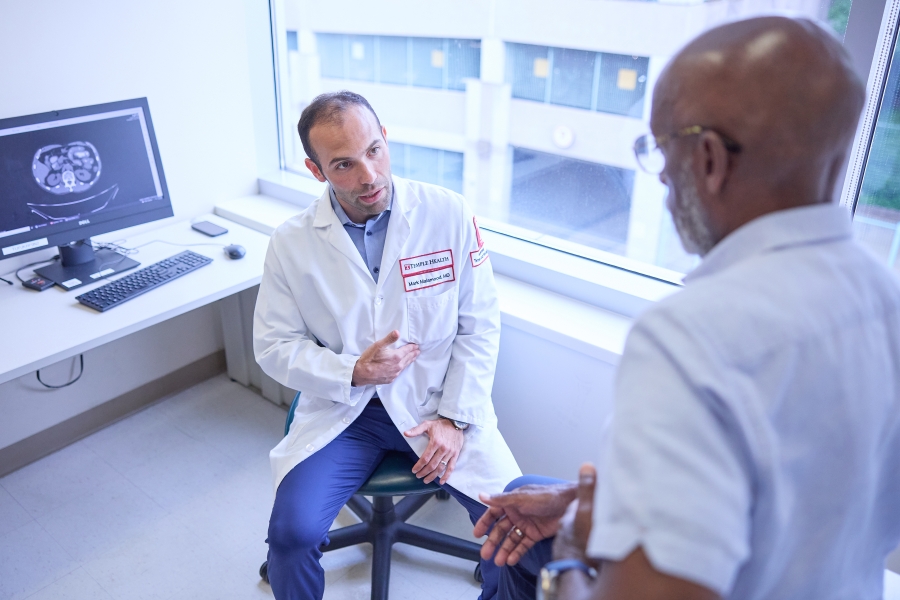As a gastroenterologist, I spend much of each day talking with patients about their digestive ailments. Many seem a little embarrassed about their symptoms, and because they're often hesitant to discuss them, they may come in with misconceptions and bad information. Part of my job is to share the facts so that patients can be empowered to take steps that will help them feel better.
Conditions affecting the gastrointestinal (GI) tract are one of the top causes of doctor visits, hospitalization, and disability in the U.S. each year. These problems can cause severe pain, and increase the risk for serious complications, such as cancer or liver failure.
Seven Important Facts About Digestive Disorders
I find that certain GI conditions tend to be particularly prone to misinterpretation. Here are seven facts about digestive disorders my patients find most surprising.
1. NSAIDs and infections are the most common cause of stomach ulcers.
Most patients who come to me with peptic ulcers get them from an infection with a kind of bacteria called Helicobacter pylori (H. pylori) or from long-term use of nonsteroidal anti-inflammatory drugs (NSAIDs) medications such as ibuprofen, naproxen, or aspirin. Both can harm the stomach's protective mucus coating, making it easier for stomach acid to damage the lining of the stomach or the small intestine.
The good news is that ulcers can typically be managed with acid suppressors and treatment for the underlying cause.
2. Celiac disease symptoms can start at any age.
While everyone with celiac disease has at least one copy of a celiac gene, that doesn’t mean everyone with a celiac gene has the disease or experiences symptoms in childhood—or at all. Some people may develop symptoms, such as diarrhea, bloating, gas, abdominal pain, skin rashes, and anemia, after a pregnancy, surgery, viral infection, or period of severe stress.
In some cases, the disease might not be recognized right away. The condition is more common than many people think, affecting up to 1 in 200 people, but the symptoms are often nonspecific, so it can sometimes take years to get a diagnosis.
3. Diet is a major cause of common gastrointestinal complaints.
A significant portion of patients experiencing disturbing gastrointestinal symptoms—including heartburn, nausea, abdominal pain, bloating, excess gas, and stool changes – are suffering from ill effects of their diets. Very often we are able to identify trigger foods or dietary behavioral patterns that cause symptoms after a brief conversation about what and how patients eat. Common culprits include processes foods, artificial sweeteners, fatty/greasy foods, spicy foods, dairy, and certain foods known to produce gas in the intestines. With the help of their primary care physician or gastroenterologist patients can often dramatically improve their quality of life by making simple dietary changes
4. GERD doesn’t always cause heartburn and heartburn doesn’t always come from GERD.
Many people plagued by frequent heartburn, a burning sensation in the chest or throat that occurs when acid from the stomach backs up into the esophagus, have gastroesophageal reflux disease, or GERD.
But heartburn can also stem from other underlying conditions. And not everyone with GERD experiences heartburn.
Many patients don't realize that GERD is actually a condition marked by several possible symptoms, such as heartburn, regurgitation (when partially digested food travels to the upper throat or mouth), chest pain, recurring cough or respiratory infections, and pneumonia. People with GERD may also have asthma, nausea, hoarseness, or dental decay.
5. Hemorrhoids are one of the most common causes of rectal bleeding.
Hemorrhoids can be uncomfortable, and they can look highly concerning when a patient doesn't realize what they're dealing with. These swollen blood vessels, which can occur around the anus or the lower rectum, may cause bleeding and irritation during a bowel movement. Because bright red blood in the toilet bowl or on toilet paper can also be a symptom of rectal cancer, it makes sense for a patient with hemorrhoids to be worried.
Thankfully, you usually don't need to be concerned. Hemorrhoids are common, affecting 75% of Americans over age 45.
And though they're unpleasant, hemorrhoids are not related to rectal cancer.
6. Diverticulosis is common and doesn’t cause problems for most people.
Diverticulosis is a condition in which sacs called diverticula develop on the wall of the colon.
It's a normal result of aging—the majority of Americans over age 60 have it — and doesn't usually cause any problems at all. In fact, the condition is usually seen when a patient undergoes imaging for unrelated reasons, such as during a routine colonoscopy.
Only 5% to 10% of people with diverticula experience diverticulitis, an inflammation of the diverticula. Diverticulitis often causes symptoms such as fever, chills, nausea, and stomach pain.
7. Stress or other emotional issues can flare, or even cause, gastrointestinal symptoms
There is a very robust connection between the brain and the gut. This is called the gut-brain axis. It is extremely common for emotional distress—such as anxiety, nervousness, depression, or anger—to manifest as gastrointestinal discomfort. Abdominal pain, nausea, and diarrhea are frequent symptoms patients experience in relation to emotional distress. Patients should still consult with a physician if they have these symptoms persistently but recognizing a relationship between symptoms and their emotional state can allow for meaningful relief through focus on mental well being.
Take charge of your digestive health
If you are having symptoms of a GI problem or would like a second opinion about treating a GI condition, the experienced specialists at the Temple Health Disease Center can help. Request an appointment online or call 800-TEMPLE-MED (800-836-7536).
Helpful Resources
Looking for more information?
